| Srl | Item |
| 1 |
ID:
077780
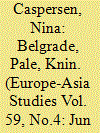

|
|
|
|
|
| Publication |
2007.
|
| Summary/Abstract |
The importance of kin-state involvement in ethnic conflicts and wars is often recognised in the literature, yet little theorising exists. This article analyses the links between the Serbian regime and the Serb leaders in Croatia and Bosnia during the Yugoslav war. Contrary to widespread assumptions, it finds that Slobodan Milosevic was not always able to control local developments; the local Serb leaders became increasingly rebellious and possessed means for limiting Belgrade's influence. Instead of assuming static ethnic solidarities, the analysis focuses on intra-ethnic divisions and the supply of resources and is thereby able to capture the fluidity of kin-state relations and the potentially limited longevity of such ties. It shows that links between a kin-state and its ethnic brethren may be weakened despite the existence of extreme insecurity
|
|
|
|
|
|
|
|
|
|
|
|
|
|
|
|
| 2 |
ID:
104113
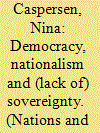

|
|
|
|
|
| Publication |
2011.
|
| Summary/Abstract |
Unrecognised states are among the least likely candidates for democratisation: they tend to be driven by ethno-nationalism, many are marked by the legacy of war and most are facing international isolation. Nevertheless, the claim to democracy has become a central part of their legitimising narrative. This article examines this apparent paradox and finds that neither ethno-nationalism nor non-recognition represents insurmountable barriers to democratisation. However, what we tend to find in these entities is a form of stagnated 'ethnic democratisation'. These findings throw new light on the relationship between democracy and nationalism; they highlight the importance of (lack of) sovereignty; and they are used to evaluate Sammy Smooha's concept of 'ethnic democracy'.
|
|
|
|
|
|
|
|
|
|
|
|
|
|
|
|
| 3 |
ID:
054420


|
|
|
| 4 |
ID:
168863
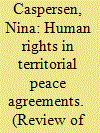

|
|
|
|
|
| Summary/Abstract |
Justice and peace are commonly seen as mutually reinforcing, and key international peacebuilding documents stress the importance of human rights. Is this apparent normative shift reflected in post-Cold War peace agreements? The existing literature is divided on this issue but has crucially treated both conflicts and peace agreements as aggregate categories. This article argues that the conflict type and the agreement's ‘core deal’ impact on the inclusion, or exclusion, of human rights provisions. Based on new coding of the 29 comprehensive agreements signed between 1990 and 2010, it compares agreements signed in territorial and non-territorial conflicts, and agreements with and without territorial autonomy. Qualitative Comparative Analysis is used to examine the different combinations of conditions that led to the inclusion of human rights. The analysis finds that agreements signed in territorial conflicts are significantly less likely to include effective human rights provisions, especially if the settlement includes territorial autonomy. Moreover, such provisions tend to be the result of high levels of international involvement, and the consequent lack of local commitment, or outright resistance, undermines their implementation. These findings point to important trade-offs between group rights and individual rights, and qualifies the notion of a liberal peace.
|
|
|
|
|
|
|
|
|
|
|
|
|
|
|
|
| 5 |
ID:
082357
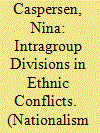

|
|
|
|
|
| Publication |
2008.
|
| Summary/Abstract |
Divisions within ethnic groups are, contrary to nationalist claims to homogeneity, found in almost every ethnic conflict. Is such intraethnic rivalry based on differing views of how best to protect collective interests or is it largely over power and spoils? The answer to this question has important implications for our understanding of ethnic conflicts and for their potential resolution. This article analyzes intraethnic rivalry in three cases: among the Serb elites in Croatia and Bosnia and among the Armenian elite in Nagorno Karabakh. It highlights the fluidity of ethnic conflicts but also finds a common trend towards factionalization and away from popular constraints
|
|
|
|
|
|
|
|
|
|
|
|
|
|
|
|
| 6 |
ID:
140416
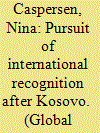

|
|
|
|
|
| Summary/Abstract |
The international recognition of Kosovo exacerbated existing uncertainties over state recognition. By its supporters it was billed as a “unique case,” but others saw it as extending the right to self-determination. Unlike most literature on state recognition, this article adopts a bottom-up approach and analyzes how other aspiring states have reacted to the new politics of recognition. Drawing on the legitimation strategies observed in five de facto states since 2008, it argues that separatist strategies are not simply shaped by changes in the practice and norms of state recognition. They are constrained, both internally and externally. While there is greater divergence in official strategies since 2008 and a greater emphasis on international engagement, the substance of the strategies is much more homogenous and demonstrates a great deal of continuity.
|
|
|
|
|
|
|
|
|
|
|
|
|
|
|
|
| 7 |
ID:
122781
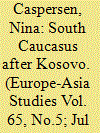

|
|
|
|
|
| Publication |
2013.
|
| Summary/Abstract |
The recognition of Kosovo did not go unnoticed in other aspiring states, but did it necessarily lead to renewed hopes for independence? Drawing on interviews with key actors, this essay analyses its effect in Nagorno-Karabakh. It finds that separatist demands are shaped by a complex interplay of external and internal forces, including international norms and practices. This explains the rather surprising finding that the Karabakh leaders in response to the recognitions of Kosovo, Abkhazia and South Ossetia gave up on recognition, at least temporarily, and instead started championing non-recognition as an attractive, sustainable status.
|
|
|
|
|
|
|
|
|
|
|
|
|
|
|
|